

Zombie Cookie: The Tracking Cookie That You Can’t Kill. Update, Jan. 16, 2015: In response to our revelation, Turn said it will suspend using its zombie cookie.

An online advertising clearinghouse relied on by Google, Yahoo and Facebook is using controversial cookies that come back from the dead to track the web surfing of Verizon customers. The company, called Turn, is taking advantage of a hidden undeletable number that Verizon uses to monitor customers' habits on their smartphones and tablets. Turn uses the Verizon number to respawn tracking cookies that users have deleted. Michael Price: Digital Privacy at the Border. Naked-Image Scanners to Be Removed From U.S. Airports. The U.S.
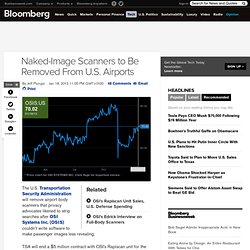
Transportation Security Administration will remove airport body scanners that privacy advocates likened to strip searches after OSI Systems Inc. (OSIS) couldn’t write software to make passenger images less revealing. TSA will end a $5 million contract with OSI’s Rapiscan unit for the software after Administrator John Pistole concluded the company couldn’t meet a congressional deadline to produce generic passenger images, agency officials said in interviews. TSA. Company bets on airport of the future: passing security with an iris scan. CAMPBELL, CALIFORNIA—As I stand in AOptix’ demo room, I stare down the cameras built into a plastic column, reminiscent of the public safety call boxes I remember from college.

I’ve never had my iris scanned before, and I'm asked to remove my glasses first. The column blares out at me on a small screen: LOOK HERE. I look. A small glow of red infrared light fills part of the column above the screen, and in just a few seconds, I’m confirmed: OK. About a minute before, I had consented to give my iris data to the company. The company claims it can scan more accurately, more quickly (six seconds), and at a greater distance (two meters) than any of its competitors. For now, AOptix isn’t the only one who thinks it’s on the right track. To Profile or Not to Profile? A Debate between Sam Harris and Bruce Schneier Sam Harris's BlogMay 25, 2012 Introduction by Sam Harris I recently wrote two articles in defense of "profiling" in the context of airline security (1 & 2), arguing that the TSA should stop doing secondary screenings of people who stand no reasonable chance of being Muslim jihadists.
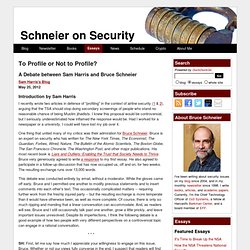
I knew this proposal would be controversial, but I seriously underestimated how inflamed the response would be. U.S. Airports a "Constitutional Twilight Zone" In this Dec. 30, 2009 file photo, Tanner Suttles, left, a Transportation Security Administration employee is screened by a TSA officer during a demonstration of passenger screening technology at the TSA Systems Integration Facility in Arlington, Va.
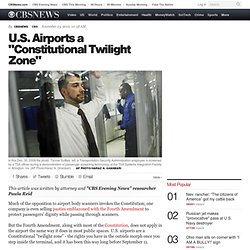
(AP Photo/Haraz N. Ghanbari) AP Photo/Haraz N. Ghanbari. EFF's Guide to Protecting Electronic Devices and Data at the U.S. Border. Amid recent reports that security researchers have experienced difficulties at the United States border after traveling abroad, we realized that it's been awhile since we last discussed how to safeguard electronic devices and digital information during border searches.
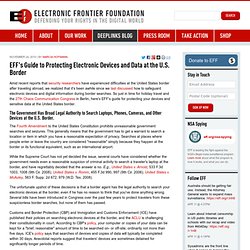
So just in time for holiday travel and the 27th Chaos Communication Congress in Berlin, here's EFF's guide for protecting your devices and sensitive data at the United States border. The Government Has Broad Legal Authority to Search Laptops, Phones, Cameras, and Other Devices at the U.S. Border. The Fourth Amendment to the United States Constitution prohibits unreasonable government searches and seizures. Protect Your Data During U.S. Border Searches. From Wired How-To Wiki The mandatory stop at the U.S.

Customs counter when returning from an international trip usually just involves answering a few questions and getting a stamp on your passport. But recently, we've seen incidents of computer security experts with ties to WikiLeaks and white hat hackers being stopped by government agents and having their laptops and phones thoroughly inspected. Security guide to customs-proofing your laptop. If you travel across national borders, it's time to customs-proof your laptop.
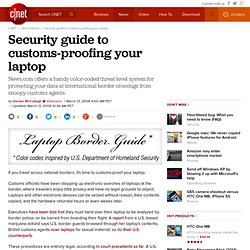
Customs officials have been stepping up electronic searches of laptops at the border, where travelers enjoy little privacy and have no legal grounds to object. Laptops and other electronic devices can be seized without reason, their contents copied, and the hardware returned hours or even weeks later. Executives have been told that they must hand over their laptop to be analyzed by border police--or be barred from boarding their flight. Keep your data safe at the border. There is no right to privacy at international borders.
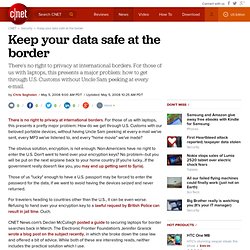
For those of us with laptops, this presents a pretty major problem: How do we get through U.S. Customs with our beloved portable devices, without having Uncle Sam peeking at every e-mail we've sent, every MP3 we've listened to, and every "home movie" we've made? The obvious solution, encryption, is not enough. Defending Privacy at the U.S. Border: A Guide for Travelers Carrying Digital Devices. Defending Privacy at the U.S. Border: A Guide for Travelers Carrying Digital Devices. Clarity Sought on Electronics Searches: U.S. Agents Seize Travelers' Devices - By Ellen Nakashima.
Nabila Mango, a therapist and a U.S. citizen who has lived in the country since 1965, had just flown in from Jordan last December when, she said, she was detained at customs and her cellphone was taken from her purse.
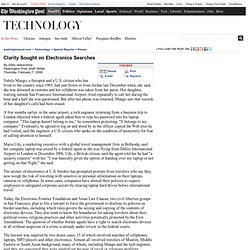
Her daughter, waiting outside San Francisco International Airport, tried repeatedly to call her during the hour and a half she was questioned. US customs can and will seize laptops and cellphones, demand passwords. The American Civil Liberties Union has brought a suit against the US government over its seizure of the laptop of a computer security consultant - a seizure carried out at a Chicago airport about a year ago without a search warrant or any charges of crimes. According to a report in Sunday's Boston Globe, the consultant - a former MIT researcher, David House - was returning from rest and relaxation in Mexico when federal agents seized his laptop. According to the Globe, the government wanted to know more about House's connections to Bradley Manning, the US Army private accused of leaking classified information to WikiLeaks.
The Practical Nomad blog: How to request your travel records. How to request your travel records [Excerpt from a simple Passenger Name Record (PNR) from the file about me kept by the CBP division of DHS. Click image for larger version. Most PNRs have more information than this. More examples and discussion of what information these records contain and how they are used.] By popular demand, I'm posting updated forms to request your PNR's and other records of your international travel that are being kept by the U.S. If you made a similar request previously, the answer you got (if any) was almost certainly incomplete.
If you want to know all of what's really in your file, you should probably make a request again, using this updated form, and appeal any response (or non-response). The DHS has recently admitted that in most cases when people asked for "all information held by CBP", their Freedom Of Information Act/Privacy Act office didn't even try to search for PNR data. Blog Archive » What Does DHS Know About You? Here’s a real copy of an American citizen’s DHS Travel Record retrieved from the U.S. Customs and Border Patrol’s Automated Targeting System (ATS). This was obtained through a FOIA/Privacy Act request and sent in by an anonymous reader (thanks!) The document reveals that the DHS is storing the reader’s: Credit card number and expiration (really)IP address used to make web travel reservationsHotel information and itineraryFull Name, birth date and passport numberFull airline itinerary, including flight numbers and seat numbersCruise ship itineraryPhone numbers, incl. business, home & cellEvery frequent flyer and hotel number associated with the subject, even ones not used for the specific reservation Again, here is the full record.